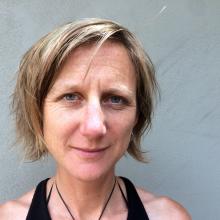

Nobody explicitly said that. But I remember sitting in the drama room with all the girls from our year group. I’m not sure exactly what was said, or where the boys went, or what was said to them, but I came out of there drenched in shame. I’d already started ‘‘the monthlies’’ by then but shhhhh.
Still, doing my best to be a feminist, I did my best to be period positive.
When I was 21 and living in a small town in Japan I went to a ‘‘t’’ party (not the kind with leaf-based beverages, the kind where you show up as something beginning with the letter) dressed as a tampon.
White fluffy sweater, white skirt. White hairband with a blue string attached to the middle. Red tights. Red shoes. When I was 23 I walked into a youth hostel in Manila and someone else waiting at the desk said, ‘‘Oh my god tampon girl’’.
It was shortly after that I discovered moon cups which are much better for the planet if you’re fortunate enough to be able to a) afford and b) use them. And much much more difficult to dress up as.
I’m thinking about periods today because everyone seems to be talking about the menopause. And by everyone I don’t just mean my own algorithm, I mean other people and the radio and books and everything. And it’s being talked about like the thing that has not before been named. And it’s good to name it. It is.
But it doesn’t make much sense to talk about the end of your life as a bleeder when there’s no conversation about all those menses gone before.
I’m thinking about periods today because I’m on the up from a particularly debilitating one.
If you’re not a person who menstruates, you might not ever have considered that menstrual cycles are not as predictable as, say, a nine to five week. And sometimes it feels ludicrous even attempting to fit one cycle into the other.
If you’re not a person who menstruates, you might not necessarily appreciate the enlarging hunger of emotions and physical flush that can accompany what some people still call ‘‘the curse’’.
This used to terrify me. Now it seems, in a good way, kind of witchy.
At Verb Wellington last year, I listened to Dr Ngahuia Murphy and Ataria Sharman talk with Whiti Hereaka about the importance of creatively connecting with the feminine divine. It was transformative. And I’m guessing, hoping, that if I look far enough back through the baba yagas of my own heritage, I can find worlds as expansive and terribly beautiful to draw on.
I don’t know.
And honestly, it’s too easy to tune in to the other cycles, those traps of productivity, until I’m floored by my own pull.
Period power is one thing. Period poverty another. Almost 25% of people who menstruate in New Zealand have missed, or are still missing out on work or school during their periods. Not because of the very real physical and mental health effect, the bloat and emotion that we hide under covers, but because they don’t have the money for the things to bleed into or onto while they go on with having their period and getting through the day.
Free period products in schools are a start but we’ve got a long way to go before we’re Scotland where sanitary stuff is now all free, free, free.
I wonder if that will mean a change as well in how the ‘‘curse’’ is perceived and whether we’ll ever get to a place where reading, and writing, about rag week doesn’t feel like a shameful incursion into an otherwise unbloodspattered day.











